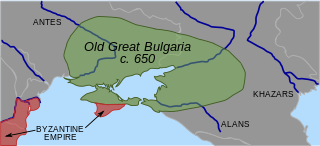
The Bulgars were Turkic semi-nomadic warrior tribes that flourished in the Pontic–Caspian steppe and the Volga region between the 5th and 7th centuries. They became known as nomadic equestrians in the Volga-Ural region, but some researchers believe that their ethnic roots can be traced to Central Asia.

The Tatars, formerly also spelled Tartars, is an umbrella term for different Turkic ethnic groups bearing the name "Tatar" across Eastern Europe and Asia. Initially, the ethnonym Tatar possibly referred to the Tatar confederation. That confederation was eventually incorporated into the Mongol Empire when Genghis Khan unified the various steppe tribes. Historically, the term Tatars was applied to anyone originating from the vast Northern and Central Asian landmass then known as Tartary, a term which was also conflated with the Mongol Empire itself. More recently, however, the term has come to refer more narrowly to related ethnic groups who refer to themselves as Tatars or who speak languages that are commonly referred to as Tatar.
Samara is a city on the eastern bank of the Volga in Russia.

Volga Bulgaria or Volga–Kama Bulgaria was a historical Bulgar state that existed between the 9th and 13th centuries around the confluence of the Volga and Kama River, in what is now European Russia. Volga Bulgaria was a multi-ethnic state with large numbers of Bulgars, Finno-Ugrians, Varangians, and East Slavs. Its strategic position allowed it to create a local trade monopoly with Norse, Cumans, and Pannonian Avars.

The Chuvash people, plural: чӑвашсем, çăvaşsem; Russian: чува́ши ) are a Turkic ethnic group, a branch of the Ogurs, native to an area stretching from the Idel-Ural (Volga-Ural) region to Siberia.
Bulgar is an extinct Oghuric Turkic language spoken by the Bulgars.

Bolghar was intermittently the capital of Volga Bulgaria from the 10th to the 13th centuries, along with Bilyar and Nur-Suvar. It was situated on the bank of the Volga River, about 30 km downstream from its confluence with the Kama River and some 130 km from modern Kazan in what is now Spassky District. West of it lies a small modern town, since 1991 known as Bolgar. The UNESCO World Heritage Committee inscribed Bolgar Historical and Archaeological Complex to the World Heritage List in 2014.
The Onoghurs, Onoğurs, or Oğurs were a group of Turkic nomadic equestrians who flourished in the Pontic–Caspian steppe and the Volga region between 5th and 7th century, and spoke an Oghuric language.
The Mongol invasion of Volga Bulgaria lasted from 1223 to 1236. The Bulgar state, centered in lower Volga and Kama, was the center of the fur trade in Eurasia throughout most of its history. Before the Mongol conquest, Russians of Novgorod and Vladimir repeatedly looted and attacked the area, thereby weakening the Bulgar state's economy and military power. The latter ambushed the Mongols in the later 1223 or in 1224. Several clashes occurred between 1229–1234, and the Mongol Empire conquered the Bulgars in 1236.

The Dulo clan was a ruling dynasty of the Bulgars, who were of Turkic origin. It is generally considered that their elite was related to the Huns and the Western Turkic Khaganate. Particularly, it is said that the Dulo descended from the rulers of Old Great Bulgaria. This state was a centralized monarchy from its inception, unlike previous Hunno-Turkic political entities, which were tribal confederations.

Kotrag was according to Nikephoros I of Constantinople a son of Kubrat of the Dulo clan of Bulgars. Following the death of his father, he began to extend the influence of his Bulgars to the Volga River. He is remembered as the founder of Volga Bulgaria.
Bulgaria is a country in Europe and a member state of the European Union.
Bulgar alphabet may refer to:

Islam in Tatarstan existed prior to the tenth century, but it began major growth in 922, when Bulgar ruler Almış converted to Islam. This was followed by an increase in missionary activity in Volga Bulgaria. Islam remained the dominant religion through the Mongol invasion and subsequent Khanate of Kazan. In 1552, the region was finally conquered by Russia, bringing the Volga Tatars and Bashkirs on the Middle Volga into the tsardom. Under Russian rule, Islam was suppressed for many years, first during the Tsardom and Empire and later during the Soviet era. Today, Islam is a major faith in Tatarstan, adhered to by 47.8–55 percent of the estimated 3.8 million population, making it one of the two dominant religions in the region, the other being Orthodox Christianity.

Old Great Bulgaria, also often known by the Latin names Magna Bulgaria and Patria Onoguria, was a 7th-century Turkic nomadic empire formed by the Onogur-Bulgars on the western Pontic–Caspian steppe. Great Bulgaria was originally centered between the Dniester and lower Volga.

The Grand Duchy of Moscow-Volga Bulgars War of 1376 was organized by princes Dmitry Donskoy of Muscovy, and Dmitry Konstantinovich of Nizhny Novgorod-Suzdal. The combined Muscovite–Suzdalian army was led by Moscow Governor Dmitry Mikhailovich Bobrok Volynskyy, and Dmitry of Suzdal's sons Vasily and Ivan Dmitriyevich. Volga Bulgaria, which was at the time an ulus of the Golden Horde, was ruled by emir Hassan Khan and Horde protégé Muhammad Sultan.
Bulgari is an Italian luxury brand.
Bolgar is a surname literally meaning "Bulgarian person" in several languages. Notable people with the surnamer include:
This page is based on this
Wikipedia article Text is available under the
CC BY-SA 4.0 license; additional terms may apply.
Images, videos and audio are available under their respective licenses.









